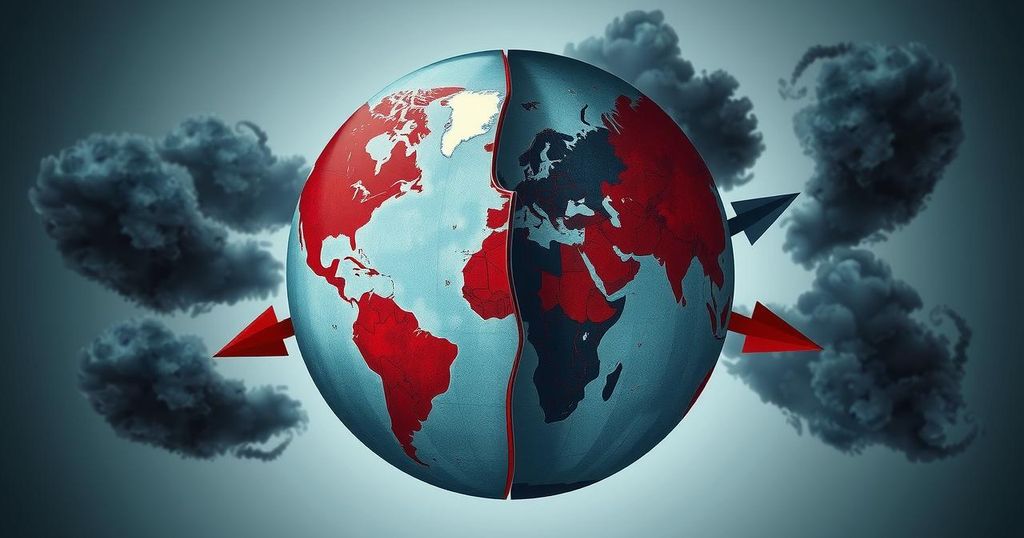Ukraine faces a shocking freeze on U.S. military aid, ordered by President Trump, amid increasing tensions in U.S.-Ukraine relations. This suspension affects over $1 billion in defense supplies, leading to significant concern among Ukrainian officials and military personnel. While soldiers express anger at the situation, they remain determined to resist Russian aggression, looking to Europe for alternative support as the U.S. withdraws.
On March 4, Ukraine was taken aback by reports of a freeze on U.S. military aid, a significant blow for a nation accustomed to tumultuous news. Volodymyr Dubovyk, head of Odesa National University’s Center for International Studies, lamented, “It hurts to watch it unfolding.” The news, reportedly ordered by President Donald Trump, has not been confirmed by either Washington or Kyiv.
Polish Prime Minister Donald Tusk indicated that Polish sources confirm the suspension. The decision followed a recent and tense meeting between Trump and Ukrainian President Volodymyr Zelensky, which brought U.S. support for Ukraine into question and led to the cancellation of a mineral deal. The political pressure on Zelensky from the Trump administration is perceived as damaging, with critiques suggesting it betrays Ukraine while empowering the Kremlin.
Oleksandr Merezhko, a Ukrainian lawmaker, expressed concern stating, “It looks as if Trump is trying to cut a deal with Russia at the cost of the weaker party, which is Ukraine.” He criticized the notion that leverage is being used against Ukraine rather than the aggressor, Russia, emphasizing that halting military aid effectively aids Russian aggression. Trump’s previously assertive stance towards Ukraine has seemingly shifted post-discussion with Putin, leading to increasingly hostile rhetoric directed at Zelensky.
Critics within Ukraine note a disconcerting evolution in Trump’s approach, with some Republican lawmakers even questioning Zelensky’s legitimacy. Yaroslav Yurchyshyn, a member of the Holos party, interpreted the aid freeze as part of Trump’s pursuit of a swift resolution to the conflict, albeit at the expense of Ukrainian interests. He stated, “their goal is peace at any cost. But for Ukraine, such an option is not acceptable.”
The military aid freeze reportedly impacts over $1 billion in defense supplies, affecting new aid as well as current shipments in transit. Bart, a sniper in Ukraine’s Special Operations Forces, expressed his outrage, remarking, “America has sided with Russia, North Korea, and Iran, they have chosen the side of darkness.” Nonetheless, many Ukrainian soldiers remain resolute, ready to defend their nation against invaders.
Ukrainian military personnel are determined to sustain their fight, underscoring that without immediate European support, their air defense capacities are at serious risk. Lieutenant Colonel Bohdan Krotevych drew attention to the urgency of finding alternatives for defense supplies, stating, “We must urgently find an alternative because civilians will die if we run out of missiles.”
In response to the aid freeze, European Commission President Ursula von der Leyen announced the ReArm Europe plan, aimed at bolstering defense capabilities across the EU, potentially unlocking close to €800 billion. Von der Leyen affirmed that Europe is prepared to assume increased responsibility during this critical time, stating, “This is a moment for Europe and we are ready to step up.”
The ability of Europe to compensate for potential shortfalls left by U.S. military aid remains uncertain. As conditions evolve, Ukraine will reassess its strategic vulnerabilities, particularly in air defense, as it navigates an increasingly daunting challenge against Russian aggression.
In summary, the United States’ decision to freeze military aid to Ukraine has elicited widespread condemnation and concern among Ukrainian leaders and soldiers alike. This significant shift in U.S. policy brings into question the reliability of American support for Ukraine at a crucial juncture in its conflict with Russia. As Ukraine seeks to address its defense shortages, European allies are urged to enhance their support, highlighting the evolving geopolitical landscape and the pressing need for robust defense capabilities in the region.
Original Source: kyivindependent.com






